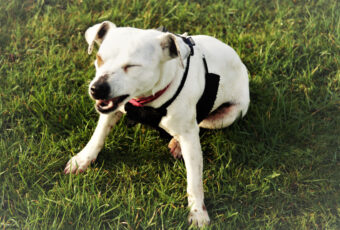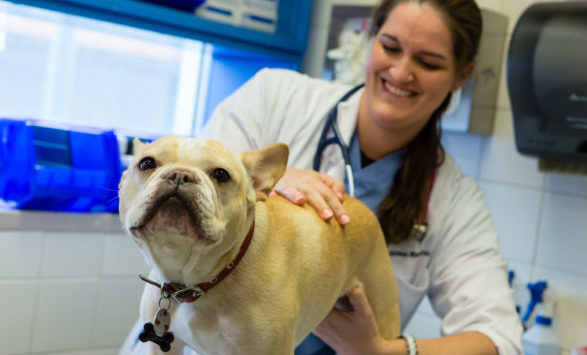Canine Influenza (Dog Flu)

Background
Like the human flu, canine influenza, or “dog flu”, is very contagious. It can easily be spread to other dogs through natural behavior, such as barking or sneezing, or from shared toys or water bowls. If your dog shows any signs of dog flu, it’s important to keep him away from other dogs to avoid passing along the infection.
- The flu virus can survive on surfaces for up to 48 hours, on clothing for 24 hours, and on hands for 12 hours.
- Though humans can’t catch dog flu, humans can spread it to other dogs if they come into contact with an infected dog or item and then touch another dog. Be sure to wash your hands, clothes, and any potentially contaminated surfaces to avoid spreading the virus to other dogs.
- Dogs are most infectious in the first 2-4 days of infection, before they start showing signs. That means your dog could be spreading the virus before you even know he is sick.
Risk Factors
Dogs who go to daycare, dog park parks, groomers, and other places where dogs gather are more likely to become infected during an outbreak.
Signs
The most common signs of canine influenza include:
- Coughing
- Runny nose
- Runny eyes
- Sneezing
- Loss of appetite
- Lethargy
- Fever (in severe cases)
Diagnosis
Dog flu is diagnosed by taking a swab from a dog’s eyelid or throat and sending it to a laboratory for testing.
There is no “rapid test” for dog flu. It may take a few days to get results.
While waiting for the lab results, your veterinarian will give you advice on how to care for your dog based on his signs and risk factors.
Treatment
There is no specific medicine for dog flu.
- Treatment will focus on helping your dog’s immune system respond to the virus.
- Your veterinarian may recommend care such as fluid therapy to fight dehydration or medication to help with decreased appetite or fever.
- Most dogs will recover from the virus on their own within 2-3 weeks.
Prevention
There is now a single vaccination to prevent both the H3N2 and H3N8 strains of the virus. The vaccination requires a booster shot two weeks after the initial vaccine. Vaccines take 3-4 weeks to provide immunity. Ask your veterinarian if the vaccine is right for your dog.
During an outbreak of dog flu, it’s best to avoid places where dogs gather, such as day care, dog parks, groomers, and boarding facilities.
Keep your dog away from other dogs to prevent the virus from spreading. Infected dogs should be isolated for at least 3 weeks.
Thoroughly wash your hands, clothes, and any surfaces that your dog has been in contact with to avoid spreading the virus to other dogs.
Make an Appointment































